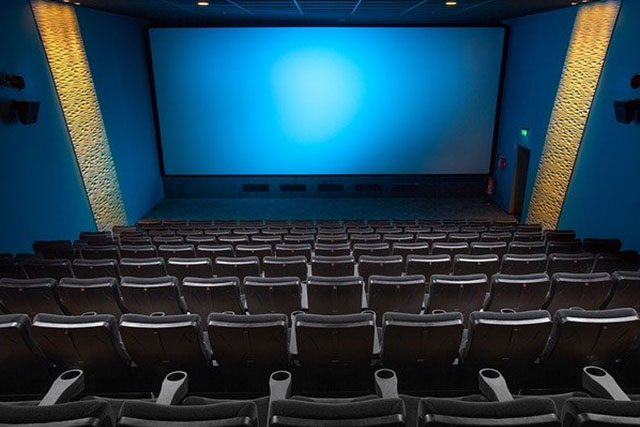Some Filipinos expressed health concerns anew following a Department of Health official’s suggestion to bar the use of comfort rooms in movie houses once cinemas reopen.
Dr. Eric Tayag, director of the the health department’s Knowledge Management and Information Technology Service, said that moviegoers must strictly adhere to health and safety protocols to mitigate the risk of catching the coronavirus disease.
“Hindi pupunuin iyong sinehan. Bawal kumain, bawal tumanggap ng tawag, iyong cellphone naka-off, huwag kayong gagamit ng CR sa sinehan hangga’t maaari, at malamang po sa hindi ay mababawasan natin ‘yung risk,” he said in a Thursday public briefing.
Tayag added that moviegoers must also wear the requisite face mask.
He said that the risk would not be that high since people are not facing each other in cinemas and that there would be more vacant seats in between so that the public can observe physical distancing.
Seating capacities would also not be full in adherence to government guidelines.
Moviegoers might also expect fewer screenings in a day so that the cinemas can disinfect after every screening.
“There should be a gap of two hours,” Tayag was quoted in another report.
Eating inside the cinema was also discouraged.
The health official likewise reminded those who are sick and those in quarantine that they are not allowed to enter movie theaters.
Tayag’s suggested restrictions, particularly the prohibition on use of comfort rooms inside cinemas, did not sit well with some Filipinos who pointed out that it may result in other sickness such as having urinary tract infection.
“Oh, ‘di ba mukhang t*nga lang na mag-reopen? Magpapataas pa ng UTI sa kat*ngahan eh,” UP statistician Peter Cayton tweeted in response to the reports.
“Ok lang sana ‘yung ‘no eating’ kaso put*ngina ‘no bathroom breaks’? T*nga ba kayo? Hindi ka nga magkaka-Covid pero magkakasakit ka naman sa pantog,” another Twitter user wrote.
Dr. Tony Leachon, former special adviser to the National Task Force Against COVID-19, only reacted that he “just can’t believe” it.
“Cinemas to open soon. MM (Metro Manila) mayors object. Here’s the rule—No bathroom breaks? Until you realize how easy it is for a health official’s mind to be manipulated, they will always be remembered as implementers of someone else’s game. I just can’t believe this. But it’s happening,” he tweeted.
Holding in urine and not fully draining one’s bladder can increase an individual’s risk of having UTI, which could result in inflammation and pain. If not treated, it can infect other organs in the body like the kidney.
‘So many ‘dont’s’
Rep. Ruffy Biazon (Muntinlupa) also questioned if the opening of the cinemas would be practical to establishments given the list of prohibitions.
“I wonder what’s the compelling reason behind allowing cinemas to open…with restrictions on occupancy, will it be enough to even cover overhead expenses? Will the sales outweigh the risks? With so many ‘dont’s,’ isn’t it easier to just have one (don’t open cinemas)?” he tweeted.
In response to the criticisms against Tayag, ABS-CBN health reporter Kristine Sabillo said that the DOH exec “wasn’t encouraging people to go out when the cinemas re-open.”
“He said there are alternative forms of entertainment. But he was also asked what can be done given the gov’t decision to reopen the economy. Kaya ‘yan ‘yung sagot niya,” she said on Twitter.
The risks
In enclosed, air-conditioned spaces like trains, the public’s prohibited from talking to companions and taking calls in transit to mitigate the risk of catching COVID-19 through respiratory droplets and aerosols containing virus particles.
Eating in indoor restaurants has also been discouraged by foreign experts since the activity entails removing one’s face mask and interacting in an enclosed space.
Such principles are similarly applied in the logic that people can’t take calls or eat while watching movies as movie houses are also enclosed, fully air-conditioned spaces.
While comfort rooms are also enclosed spaces, the risk of catching COVID-19 if one were to relieve oneself and practice safety protocols inside—remains questionable to some.
“The risk of bathroom exposure is largely theoretical—possible, but not proven,” Dr. John Ross, who practices hospital medicine at Brigham and Women’s Hospital, said to Harvard Health Publishing before.
“There are other elements in play that make the bathroom less risky than it might seem. Your exposure time is a factor with transmission, the publication said.
Dr. Todd Ellerin, director of infectious diseases and vice chairman of the department of medicine at South Shore Hospital, said that it is a low-risk transmission since people usually spend a short time in comfort rooms.
“Time is on your side. Save the long visits for your home,” he said.
“The fundamental steps are: Put a mask on before you enter. Wash your hands immediately after. You can also wear glasses to protect your eyes. There are a number of high-touch surfaces, and the virus, along with bacteria, can exist on them. It’s good to minimize contact by using your foot or toilet paper when lifting, turning, or pulling anything,” the publication said.
What now?
Last week, the Inter-Agency Task Force for the Management of Emerging Infectious Diseases announced the resumption of operation more businesses including the traditional cinemas and video-and-interactive-game arcades in a bid to revive the country’s pandemic-hit economy.
As of Friday, however, the Metro Manila Development Authority said that majority of Metro Manila mayors are not keen on opening movie houses because of the risks.
READ: Philippines to allow cinemas, public attractions to reopen to revive growth
“In case na ‘yan po ay papayagan ng ating pangulo, gagawa po tayo ng guidelines. Siguro instead of 50% capacity, nasa 20% to 30% capacity,” MMDA General Manager Jojo Garcia said in a public briefing.
Filipinos previously pointed out that being in an enclosed space for a prolonged period would go against the government’s “Apat Dapat” rule to prevent spread of COVID-19.
READ: COVID-19 risks raised anew amid debated plan to reopen cinemas in GCQ areas
One of these focuses on air circulation, where there should be fresh air flowing in indoor spaces to prevent aerosols with potential viral particles from going stagnant and remain suspended for others to inhale.










